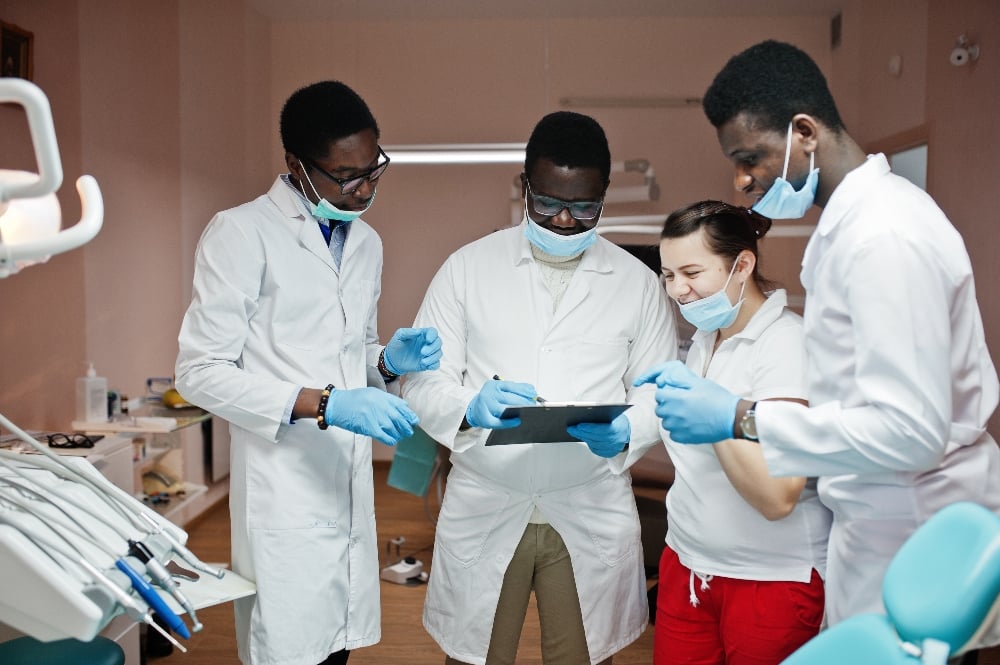Posted by Amy Carbone on Jan 10, 2020 9:00:00 AM
You've graduated dental school– congratulations! Here are 7 tips to help you transition into your new career as a practicing dentist.

1. Learn to Manage Your Time Well
Learning to manage your time effectively is a key to becoming a successful associate dentist or solo practitioner. You may have become accustomed to being able to take your time with procedures, up to an hour or more for a filling. At an actual practice, dentists rarely have more than a half-hour for a filling or about an hour for a crown.
New associate dentists can keep their schedules light for the first several weeks to allow for the learning curve. Specialty dentists can delegate simpler tasks to hygienists or assistants, helping them to stay focused specifically on tasks that require their professional skills.
2. Use Feedback as a Learning Opportunity
You're going to face a number of challenges adjusting to life outside of dental school, and not everyone you come into contact with will be patient or accepting of your inexperience. While it may be difficult to receive feedback, don't take frustration or criticism too seriously while you're still learning. It’s unlikely to be a real reflection on you and your ability to do the job.
3. Learn to Work Well Under Pressure
Remember the time crunch you'll be under when working at a dental practice. Your new schedule can seem like a lot of pressure, especially when all eyes are on you to see how well you'll do. Cope with learning to work well under those demands. Managing your time is one part, but so is being able to make quick decisions and work accurately with little preparation.

4. Continue to Improve Your Skills
Dental school will have given you a solid clinical foundation, but it's impossible for any educational program to cover every possible scenario that could come up with a patient. Continue to grow your skill set by participating in continuing education classes and shadowing your peers or mentors from time to time to learn new techniques. Avoid getting into the habit of becoming comfortable in your learned skills and neglecting to expand on them throughout your career.
5. Contribute to a Positive Office Dynamic
Working in an office can be challenging for anyone, but jumping into a busy practice right after your training can be especially jarring. Learn to work well with administrative staff, dental hygienists, and other associate dentists. Contribute to a positive work environment by encouraging others and being open to learning from them. If you opened your own practice, consider boosting team morale with a catered lunch and a morning team meeting.
6. Network with Your Peers
Building relationships is an important part of developing your career as a professional dentist. Spend time networking with your peers and creating business acquaintances and friendships along the way. Attend local conferences for entrepreneurs or associate dentists and get to know other providers in the area, including your competition. By making an effort to socialize with colleagues and learn about competitors, you can determine opportunities and challenges for your practice, areas in which your competitors are either neglecting or excelling.

7. Make Time for Relaxation and Socialization
Dental school often goes faster than you expect and before you know it, you've jumped out of the frying pan and into the fire. It seems like the social life that took a dive in school shows no signs of resurfacing and long hours leave you little time to rest and recharge.
Avoid viewing socialization and relaxation as luxuries that you'll "get around to later." These are critical for your mental, emotional, and physical health, all of which enable you to do your job. Schedule time away from work (and your phone) by getting outdoors or into a good book, even if it’s just once a week. Fit in time with friends and family, even if it's just dinner once a month. If you don't make time for relaxation on your own terms, your mind and body will decide for you in the form of burnout.
Fresh Out of Dental School? Here's How to Stay Sane for the First Year
When you first join a dental practice or open one of your own as a new dentist, it can be hard not to feel the fear of failure. Remind yourself that every new dentist starts somewhere and you still have plenty of time to learn. You've worked hard to get where you are and there's very little that can actually "break" your brand-new career. (You should make sure you’ve got the right insurance products to protect your personal and professional assets.)
Use mistakes as learning opportunities and stay motivated by recognizing when you do a good job, even if others around you aren't actively encouraging you.
About Treloar & Heisel
Treloar & Heisel is a premier financial services provider to dental and medical professionals across the country. We assist thousands of clients from residency to practice and through retirement with a comprehensive suite of financial services, custom-tailored advice, and a strong national network focused on delivering the highest level of service.
Treloar & Heisel and Treloar & Heisel Property and Casualty are divisions of Treloar & Heisel, LLC.
Insurance products offered through Treloar & Heisel, LLC.
Treloar & Heisel, LLC. and its divisions do not offer career management advice. Please consult a professional concerning this topic.


